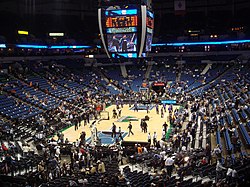
The New Orleans Pelicans are an American professional basketball team based in New Orleans. The Pelicans compete in the National Basketball Association (NBA) as a member of the Southwest Division of the Western Conference. The team plays its home games at Smoothie King Center.

The Minnesota Timberwolves are an American professional basketball team based in Minneapolis. The Timberwolves compete in the National Basketball Association (NBA) as a member of the Northwest Division of the Western Conference. The team was founded in 1989. Its majority owner is Glen Taylor, who also owns the WNBA's Minnesota Lynx. Currently, Taylor is in a legal battle over ownership of the team with Alex Rodriguez, Marc Lore, and Michael Bloomberg. The Timberwolves play their home games at Target Center, their home since 1990.
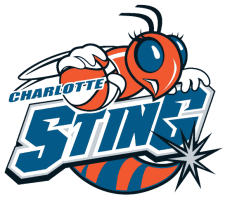
The Charlotte Sting were a Women's National Basketball Association (WNBA) team based in Charlotte, North Carolina, one of the league's eight original teams. The team folded on January 3, 2007.
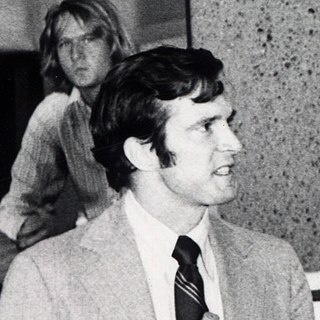
James Fred Hofheinz is an American lawyer and politician who served as the 55th mayor of Houston, Texas, from 1974 to 1978.

Smoothie King Center is a multi-purpose indoor arena in New Orleans, Louisiana. It is located in the city's Central Business District, adjacent to Caesars Superdome. The arena opened in 1999 as New Orleans Arena and has been home to the New Orleans Pelicans of the National Basketball Association (NBA) since 2002. The New Orleans VooDoo of the Arena Football League played their home games in the arena from 2004 until the team disbanded in 2008. The VooDoo resumed play at the arena in March 2011, until after the 2015 AFL season when the franchise folded.

Glen Albert Taylor is an American billionaire business magnate and politician from Minnesota. Taylor made his fortune as the founder and owner of Minnesota-based Taylor Corporation, one of the largest graphic communication companies in the United States.

Al Ricardo Jefferson is an American former professional basketball player. He was a high school All-American for Prentiss High School in Mississippi before skipping college to enter the 2004 NBA draft, where he was drafted 15th overall by the Boston Celtics. He played 14 seasons in the National Basketball Association (NBA) for the Celtics, Minnesota Timberwolves, Utah Jazz, Charlotte Hornets and Indiana Pacers, earning third-team All-NBA honors in 2014 with the Hornets.
The 2005–06 NBA season was the 60th season of the National Basketball Association (NBA). The Miami Heat defeated the Dallas Mavericks in the NBA Finals, four games to two, to win their first NBA championship.
The 2002–03 NBA season was the 57th season of the National Basketball Association (NBA). The season ended with the San Antonio Spurs beating the New Jersey Nets 4–2 in the 2003 NBA Finals. It was Michael Jordan's last season in the NBA. It marked the first finals since the 1998–99 NBA season in which the Lakers did not appear, as well as the Spurs' first finals appearance since then.
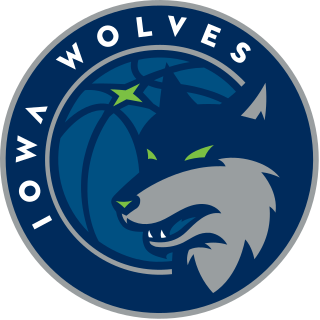
The Iowa Wolves are an American professional basketball team in the NBA G League based in Des Moines, Iowa, and are affiliated with the Minnesota Timberwolves. The Wolves play their home games at the Wells Fargo Arena and compete in the Western Conference of the NBA G League. From 2007 to 2017, the team was known as the Iowa Energy in the NBA Development League (D-League) until being purchased and renamed by the Timberwolves. They broke the D-league attendance record on their first home game with 8,842 fans. They later set the record again in game two of the 2011 D-League Finals with an attendance of 14,036 fans. They won the 2011 D-League Finals, defeating the Rio Grande Valley Vipers two-games-to-one.

Hurricane Katrina devastated the city of New Orleans on August 29, 2005, and caused extensive damage to the New Orleans Arena. As a result, the National Basketball Association (NBA)'s New Orleans Hornets were unable to play any home games at the Arena for both the entire 2005–06 and 2006–07 seasons, and temporarily relocated to Oklahoma City, Oklahoma, to become the New Orleans/Oklahoma City Hornets. After playing the majority of home games for both the 2005–06 and 2006–07 seasons at the Ford Center in Oklahoma City, the Hornets returned to New Orleans for the 2007–08 season.

The Vancouver Grizzlies relocation to Memphis was a successful effort by the ownership group of the Vancouver Grizzlies to move the team from Vancouver, British Columbia, Canada to Memphis, Tennessee, United States. The team began play as the Memphis Grizzlies in the 2001–02 season. It was the first of three National Basketball Association (NBA) franchise moves between 2001 and 2008, and the third of four major league teams to relocate from Canada to the United States between 1995 and 2005.
The 1993–94 NBA season was the Timberwolves' 5th season in the National Basketball Association. The city of Minneapolis hosted the 1994 NBA All-Star Game. In the 1993 NBA draft, the Timberwolves selected Isaiah Rider out of UNLV with the fifth overall pick, and acquired Mike Brown from the Utah Jazz in the off-season. The Timberwolves continued to struggle losing their first five games of the season, then posted two 7-game losing streaks in December and February, holding a 14–32 record at the All-Star break. At midseason, the team traded Luc Longley to the Chicago Bulls in exchange for Stacey King. The Timberwolves posted an 8-game losing streak in March, and lost their final ten games of the season, finishing fifth in the Midwest Division with a 20–62 record.
The New Orleans Pelicans are a professional basketball team in the National Basketball Association (NBA). The team commenced play in 2002 after the NBA granted founder George Shinn an expansion franchise to play in New Orleans. The Pelicans' establishment was unusual compared to most modern expansion teams in that New Orleans' roster was not stocked through an expansion draft. Instead, Shinn transferred the entire basketball organization of his former team, the Charlotte Hornets, to his new franchise.
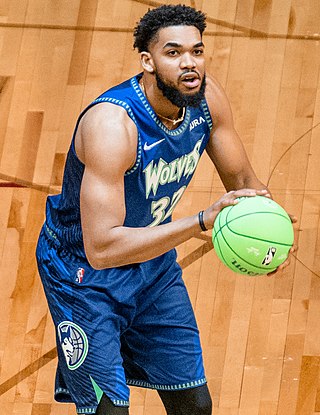
Karl-Anthony Towns Jr., nicknamed “KAT”, is a Dominican-American professional basketball player for the New York Knicks of the National Basketball Association (NBA). He played college basketball for the Kentucky Wildcats. Towns was named to the Dominican Republic national team as a 16-year-old. He was selected with the first overall pick in the 2015 NBA draft by the Minnesota Timberwolves.
The following is a timeline of the organizational changes in the National Basketball Association (NBA), including contractions, expansions, relocations, and divisional realignment. The league was formed as the Basketball Association of America (BAA) in 1946 and took its current name in 1949. The histories of NBA franchises that were also members of the American Basketball League (ABL), National Basketball League (NBL), National Pro Basketball League (NPBL), and American Basketball Association (ABA) are also included.
The National Basketball Association has undergone several rounds of expansion in the league's history, since it began play in 1946, to reach 30 teams. The most recent examples are the additions of the Charlotte Hornets and Miami Heat in 1988; the Minnesota Timberwolves and Orlando Magic in 1989; the Toronto Raptors and Vancouver Grizzlies in 1995 ; and the Charlotte Bobcats in 2004. In September 2024, Commissioner Adam Silver stated that the NBA would have discussions about a potential expansion of the league sometime during the 2024–25 season though not during the league's 2024 fall meetings, with an ESPN article stating that a number of factors including the potential sale of the Boston Celtics has led the league to go slower with the expansion process. In addition, the article stated that the potential expansion teams may begin play in the 2027–28 season should one occur.
Relocation of major professional sports teams occurs when a team owner moves a team, generally from one metropolitan area to another, but occasionally between municipalities in the same conurbation. The practice is most common in North America, where a league franchise system is used and the teams are overwhelmingly privately owned. Owners who move a team generally do so seeking better profits, facilities, fan support, or a combination of these.
